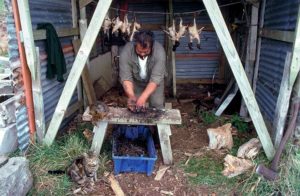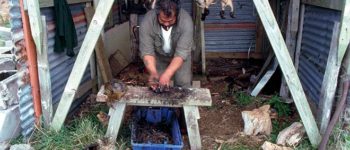1921: Weka Protection
January 8, 2021
By AHNZ
 “Some 24 years ago, the Wekas were plentiful all over the Peninsula, and then in some mysterious manner, they must have unanimously decided to seek some other home, for they suddenly and mysteriously altogether disappeared. Where they went, why they went, and what they did during their absence, will never be known to any human being, but it is certain that some of them must have retained pleasant memories of the Peninsula and imparted them to their descendants, for a few years ago scattered parties of them in different parts of the county, and they are now again well distributed.”- Akaroa Mail and Banks Peninsula Advertiser (1903)
“Some 24 years ago, the Wekas were plentiful all over the Peninsula, and then in some mysterious manner, they must have unanimously decided to seek some other home, for they suddenly and mysteriously altogether disappeared. Where they went, why they went, and what they did during their absence, will never be known to any human being, but it is certain that some of them must have retained pleasant memories of the Peninsula and imparted them to their descendants, for a few years ago scattered parties of them in different parts of the county, and they are now again well distributed.”- Akaroa Mail and Banks Peninsula Advertiser (1903) New Zealand weka are not endangered in reality but certainly are by government law. In fact, certain regions are thick with them. For some reason, the Government believes weka ought to like living on the east coast of the South Island as well as the West. Weka do not agree, nor do they take great interest in the North Island.
New Zealand weka are not endangered in reality but certainly are by government law. In fact, certain regions are thick with them. For some reason, the Government believes weka ought to like living on the east coast of the South Island as well as the West. Weka do not agree, nor do they take great interest in the North Island.
It’s not clear that weka ever did like living where the Government say they ought to. But, until they change their minds about that they will remain “endangered.” This protects the chicken industry, thwarts Roger Bettie, and justifys a budget for those employed by DOC’s Weka Recovery Plan.
Specific protection for the Weka in government legislation was made in the Animals Protection and Game Act (1921) but after over 100 years it doesn’t seem to have done much good at all for the birds…
ANIMALS ABSOLUTELY PROTECTED, continuedWoodhenBlack woodhen (weka), (Gallirallus brachypterus).
Brown woodhen (weka), (Gallirallus australis).
North Island woodhen (weka), (Gallirallus australis greyt).
South Island woodhen (weka), (Gallirallus hectori).
Stewart Island woodhen (weka), (Gallirallus australis scotti)
 There was also some concern and a bit of legislation passed to help them in 1903, hence the Akaroa Mail and Banks Peninsula Advertiser article which also says, “Luckily, for itself, it is not very good eating, its oily body having a peculiarly “mousey” flavour, objectionable to Europeans.”
There was also some concern and a bit of legislation passed to help them in 1903, hence the Akaroa Mail and Banks Peninsula Advertiser article which also says, “Luckily, for itself, it is not very good eating, its oily body having a peculiarly “mousey” flavour, objectionable to Europeans.”Apparently that weka oil makes good medicine as a skin application similar to Deep Heat. Against what the Banks Peninsula folk say, Captain James Cook and the people of the Chatham Islands quite like eating weka…
“…they eat very well in a pye or fricassee.”- Captain Cook“Weka thrive on the Chatham Islands, to the extent that thousands are harvested every year for food….However, if Chatham Islanders wish to take prepared weka back to mainland New Zealand (where all weka are fully protected) a permit is needed from the Department of Conservation..”- ref. chathams.co.nz
In 1905 the weka was introduced to the Chatham Islands so, as such, is not protected there. They can be hunted and eaten but not exported to mainland NZ because, I suppose, Big Chicken don’t want the competition and have monopoly support from The State. There is a possible collusion against a weka industry on the part of Voltaren, Deep Heat, Tegal and Inghams and the Department of Conservation!?
“Decades after he began farming and eating weka, renegade conservationist Roger Beattie is ready to become a martyr.“The Christchurch man has long dreamed of commercialising endangered species as a means of saving them.”- Weka farmer takes on DOC: ‘I’m prepared to go to jail’, Stuff (2017)
The Government has done an awful job of playing god with the weka, as it has with the notornis and possums and ferrets and….everything it ever touches- really!
Might be time they let the weka go.
—
Ref. also Trailblazers: The New Zealand Story; AHNZ
Ref. Akaroa Mail and Banks Peninsula Advertiser (1903); Papers Past
Image ref. Robin Morrison, digitalnz.org
Image ref. Willowbank.co.nz
 Like Comment Share
Like Comment Share
Anarchist History of New Zealand: The real problem of humanity is the following: We have Paleolithic emotions, medieval institutions and godlike technology- Edward O. Wilson





